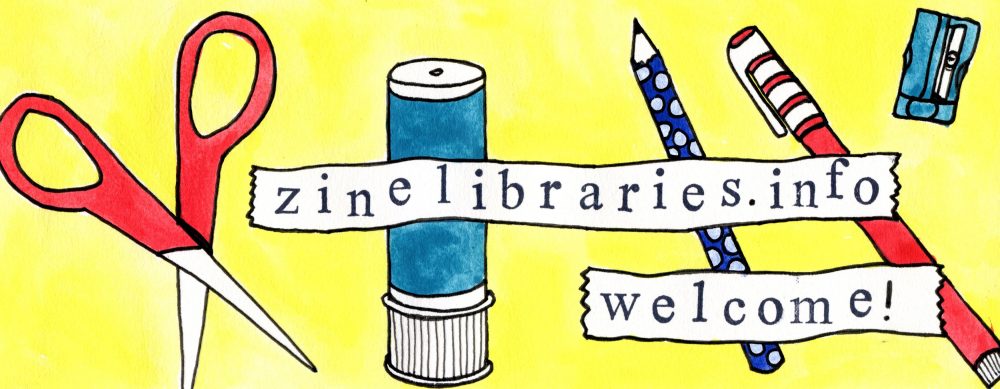Friday July 19
Breakout session 1, 10:15- 11:30am
Session name: Zine collections
Facilitator: Kristin Alexander    Note taker: Des Alaniz
Guiding questions for this session?
- Talking to folks about starting a new collection
- Sharing about starting a new collection
- How do other folks circulate their collections?
- Participating as a zine library at a zine fest in san antonio
- How to Display them?
Circulating and Archival collections
Making the choice that circulating collection will have some loss/damage, but access is important
Getting buy-in from catalogers and tech services folks
Providing folks with guidelines for cataloging
Richmond Museum of Fine Arts (Virginia context): role is half acquisitions, half cataloging, all this is in one role in addition to other duties
- Buy in from tech folks here looks like sitting with the cataloger and explaining what they are doing
- Putting collections into worldcat; zines circulating, none of the other holdings do
- Financial buy in is important
- Cataloging part is a struggle
Intern/curator/librarian to pre-catalog zines, do rich text descriptions of zines that catalogers can map to a MARC record or whatever
Taking as much cataloging information as possible from the zinesters themselves, communicating that process to folks donating zines to the collection.Â
Being responsive to zine makers is essential!
- Creating a good zine donation form-half page on who we are, what we want to do with the zine
- Taking donation from the university and from students also requires informed consentÂ
- Zine cataloging events!
- Talk to Jenna F about cataloging and intern program!
- Intern can create basic record and be reviewed by catalogers/tech services
- Creating a zine that includes “What we will do with your zine†to take to local zine fests
- Zine compensation- if you cant use institutional funds or resources, just making zines to trade can help
- Having to go through acquisitions to purchase zines
- Distributor to libraries (Oh Boy Comics)
- Collecting zines that are not written in English
Sharing these zine donation forms, etc online (thru zinelibraries.info?)
Commissioning zines as a collection from local artists
Supporting artists by buying everything you can
Raising funding to start a collection
A little goes a long way; not having a budget can be useful “just keep buyingâ€
Being given too much and not being able to spend it isnt a good look either
Community suggestion form for acquisitions
Collection Development Policy impacts this
-at an art institution, focusing between book arts and zines is the priority. When you go in that direction they tend to be more expensive (proximity to artists’ books)
-looking at campus DEI office for mini grants and such; looking for other pots of money on campus to support the collection
-focusing on specific areas while also accepting donations from all over
-connecting collection scope to faculty research areas, student interest, library DEI goals or instruction missions
-chapbooks, bound books o zines are hard to draw distinctions on as part of “zine†collection
If zinester calls it a zine, it’s a zine!
-purchasing two copies of zines: one for archive and one for circulation
Organizing and cataloging collections
-alpha by title
-alpha by author (allows for collocation by author)
-LC call #’s allow for zines to be retrieved alongside other works but creates problems also. Still housed together at least!
-archival collection is in a finding aid (as a manuscript collection)
-at simmons: collection is on its own, with a three letter code for category (activism=ACT) and a cutter number for title
-@ art museum, zines are one of few things not in closed stacks
– how are patron folks are searching? Are ppl using the catalog for discovery or browsing IRL?
-anyone with experience having a zine collection that circulates in a library of items that doesnt? How much do people use them at the library? Could have a manual check out system
-folks concerned about circ stats? If folks are browsing how do we track use?
Depends on what admin is using for justification: defining success and how it is measured
-blue shelf on every row to place browsed items; do not reshelve!!!!
Two boxes: i read and i liked, i read and i didnt like!
-zines requested for instruction sessions with art faculty
-demonstrating that zines are not a “weird†collection but also belongs in a library and is another form of material culture
FUTURE PROJECT: Collecting forms, policy statements, etc and creating shared drive for collection policies, zine donation forms etc
Labeling zines?
- -Zine collection sticker (designed by zine libs!) placed on each item
- -barcode on the exterior folder
- -putting tattle tape on the board/comic book stiffener
- -important to mark as a library item
- -labeling so that folks who may not be super familiar with collection can also reshelve them proper
Volunteering with ALA zine pavilion: email zinepavilion@gmail.com
Antagonistic patrons re: zines?
- People trying to censor collections
- Form for folks who have issues that goes to admin
- Intentional collecting on “controversial†topics; waiting for possible blowback but also knowing you have admin support is big
- Zine scavenger hunt! Find a zine with X in the collection (good programming idea haha)
- Having a review process for hate speech in donation and collections
- Getting author contact to get bg on what zinester was thinking
- Other zine librarians: reinventing the wheel, stepping on toes
Including one’s own zine in the collection? No major issues

